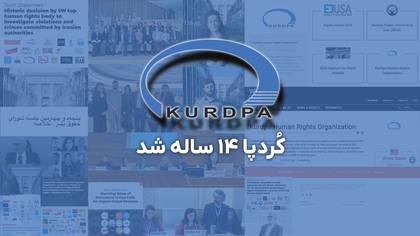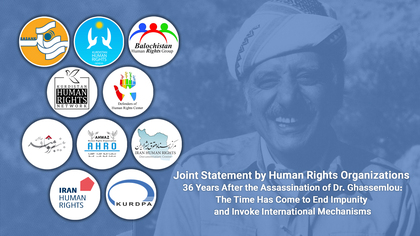Iran gave Syria $1 billion to aid regime against sanctions, documents reveal
20:06 - 16 February 2012

Kurdpa - The Iranian regime has been helping Syria circumvent international sanctions imposed for the brutal slaughter of its civilians, according to documents from the Syrian president\'s office.
The documents, obtained by Haaretz News, reveal that Iran has given the Syrian regime more than $1 billion to help relieve pressures of an international oil embargo and other restrictive measures on travel and trade through its central bank.
Currently, the U.S., Turkey, European Union and Arab League have imposed crippling sanctions on Syria’s trade, banking and oil exports in order to deter its massacring of citizens.
A popular global hacking group called Anonymous leaked the documents through a cyber-hacking of the Syrian president’s office email server.
According to Haaretz, the account belonging to the minister of presidential affairs, Mansour Azzam, included two documents signed by him dealing with relations between Syria and Iran.
The documents, written two months ago and detailing conversations between Iranian representatives visiting Syria, repeatedly refers to Syria\'s wish to \"learn from the Iranian experience in this area.\"
The documents delineated ways in which the Islamic regime, which is currently struggling financially under severe internationally imposed economic measures as well, could aid Syria in bypassing sanctions.
Syria derives about a fifth of its gross domestic product from oil exports. About 90 percent of its oil is sold to the EU, which has placed an oil embargo on Syria.
The effects of the international sanctions and embargos on the Syrian regime are evident and have led to the country’s current economic crisis. The regime has exhausted trade partners and needs revenue to pay its 15,000 militia men, hired to crack down against protestors.
Syrian protestors have been actively voicing their disenchantment against their President Bashar Al-Assad since January of last year. Since then, an estimated 6,000 Syrians have been killed.
Though many have pointed to the symbiotic relationship between Tehran and Damascus for quite some time, the Islamic Republic of Iran’s surge of material support to Syria comes at a time when international pressure against Syria is at its peak, and the Syrian regime’s massacre against its civilians is most violent.
Syrian military defectors are on the rise and often unwilling to fire at protesting crowds.
According to the leaked documents, Iran\'s delegation that traveled to Syria announced its allocation of $1billion to Syria in exchange for basic food items, such as meat, olive oil and fruit.
This coincides with Iran’s recent move to barter with trade partners to import basic food items. Iran is likewise experiencing the harsh economic effects of international sanctions and has not been able to maintain its usual positioning on the global market.
The Iranian delegation also discussed ways it could help the Syrians continue to export oil despite the embargoes. The Iranian regime promised to monitor the buying of 150,000 barrels of oil per day from Syria for a year \"to use it domestically or resell it to others,\" the documents stated.
To reciprocate, Iran would supply Syria spare parts for the petroleum industry that are nearly impossible to obtain under sanctions.
Last month, U.S. officials blew the cover of an Iranian initiative designed to help Syria export its oil in a clandestine manner, bypassing American and European embargoes. The plan allowed Syria to covertly export Syrian crude oil to Iran, which would quietly sell the oil on the international market and send profits back to Syria.
Transit records documented one of these shipments, involving more than 100,000 tons of crude oil.
\"The oil shipment to Iran was designed to evade the sanctions that have been imposed on Syria,\" a senior U.S. Treasury Department official close to the case said.
In response, the Treasury Department launched a campaign aimed at monitoring the insurance and registration of international tankers shipping Syrian oil overseas. Many of these entities are insured in the U.S.
The global community continues to pressure Assad’s regime, condemning the violence in the Syrian city of Homs last week in the bloodiest episode in the Syrian opposition’s yearlong endeavor.
Source - FoxNews.com
The documents, obtained by Haaretz News, reveal that Iran has given the Syrian regime more than $1 billion to help relieve pressures of an international oil embargo and other restrictive measures on travel and trade through its central bank.
Currently, the U.S., Turkey, European Union and Arab League have imposed crippling sanctions on Syria’s trade, banking and oil exports in order to deter its massacring of citizens.
A popular global hacking group called Anonymous leaked the documents through a cyber-hacking of the Syrian president’s office email server.
According to Haaretz, the account belonging to the minister of presidential affairs, Mansour Azzam, included two documents signed by him dealing with relations between Syria and Iran.
The documents, written two months ago and detailing conversations between Iranian representatives visiting Syria, repeatedly refers to Syria\'s wish to \"learn from the Iranian experience in this area.\"
The documents delineated ways in which the Islamic regime, which is currently struggling financially under severe internationally imposed economic measures as well, could aid Syria in bypassing sanctions.
Syria derives about a fifth of its gross domestic product from oil exports. About 90 percent of its oil is sold to the EU, which has placed an oil embargo on Syria.
The effects of the international sanctions and embargos on the Syrian regime are evident and have led to the country’s current economic crisis. The regime has exhausted trade partners and needs revenue to pay its 15,000 militia men, hired to crack down against protestors.
Syrian protestors have been actively voicing their disenchantment against their President Bashar Al-Assad since January of last year. Since then, an estimated 6,000 Syrians have been killed.
Though many have pointed to the symbiotic relationship between Tehran and Damascus for quite some time, the Islamic Republic of Iran’s surge of material support to Syria comes at a time when international pressure against Syria is at its peak, and the Syrian regime’s massacre against its civilians is most violent.
Syrian military defectors are on the rise and often unwilling to fire at protesting crowds.
According to the leaked documents, Iran\'s delegation that traveled to Syria announced its allocation of $1billion to Syria in exchange for basic food items, such as meat, olive oil and fruit.
This coincides with Iran’s recent move to barter with trade partners to import basic food items. Iran is likewise experiencing the harsh economic effects of international sanctions and has not been able to maintain its usual positioning on the global market.
The Iranian delegation also discussed ways it could help the Syrians continue to export oil despite the embargoes. The Iranian regime promised to monitor the buying of 150,000 barrels of oil per day from Syria for a year \"to use it domestically or resell it to others,\" the documents stated.
To reciprocate, Iran would supply Syria spare parts for the petroleum industry that are nearly impossible to obtain under sanctions.
Last month, U.S. officials blew the cover of an Iranian initiative designed to help Syria export its oil in a clandestine manner, bypassing American and European embargoes. The plan allowed Syria to covertly export Syrian crude oil to Iran, which would quietly sell the oil on the international market and send profits back to Syria.
Transit records documented one of these shipments, involving more than 100,000 tons of crude oil.
\"The oil shipment to Iran was designed to evade the sanctions that have been imposed on Syria,\" a senior U.S. Treasury Department official close to the case said.
In response, the Treasury Department launched a campaign aimed at monitoring the insurance and registration of international tankers shipping Syrian oil overseas. Many of these entities are insured in the U.S.
The global community continues to pressure Assad’s regime, condemning the violence in the Syrian city of Homs last week in the bloodiest episode in the Syrian opposition’s yearlong endeavor.
Source - FoxNews.com



